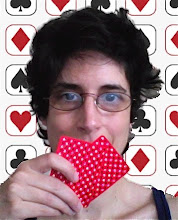2000+ Good Decisions
What does it take to win a large multi-table tournament, one that has thousands of entrants and runs over the course of three days?
By my calculations, it takes about two thousand good decisions. I figure a three-day event lasts a total of about 34 hours. At a well-run live game, you can see approximately 30 hands an hour. Of those, you'll only play a certain precentage (all told, including short-handed, and heads-up), let's say 20 percent. Some of the decisions will be binary (e.g., continue to play the hand or fold), but a lot of them will have multiple sub-elements (e.g.: choose to raise, and decide how much). I settled on 2000 as a nice round number.
At first blush, two thousand decisions doesn't seem like a lot. But ask yourself: how many times have you gone through the same motion 2000 times without error? (Breathing, blinking, and other autonomic functions don't count.) Do you think you could add 2000 columns of numbers, for example, without once making a mistake? Making 2000 correct decisions in a row, under pressure, is a huge challenge.
Sure, you could make a mistake or two and recover. If you're lucky. But in a tournament, one mistake can also be completely disastrous. You don't have to make the optimal play every time, but you do have to avoid making bad decisions. You have to do the right thing over and over, hour after hour, for two and a half long days of playing.
The next time you describe someone who wins a large-field tournament as a luckbox, remember this. Sure, they probably did run like god. Nobody gets through a huge game like that without running hotter than the sun, having good hands hold up and sucking out when necessary. But nobody makes it through a field that big on luck alone, either. Those people sitting at the final table probably made more good decisions in a row to get there than any athlete in the history of the world has ever made good plays in a row. That takes mental toughness, concentration, and stamina, and it is much harder to do than it looks.
Labels: discipline, strategy, tournament

5 Comments:
One more element - NOT getting UNLUCKY.
Your good decisions may lead to a doubleup as long as one of those last 2 nines doesn't come...... ahhh, shucks, a 9 on the river.
I totally agree. To get to the final table of a huge event whether it be live or online you need to make a multitude of good decisions and also hope the cards fall for you. Takes a great deal of skill and of course some luck.
Interesting post :-)
For awhile, I was vexed with my results in MTT and vowed to post every hand that cost me half my chips or caused me to bubble out. As it turns out, posting ~30% of them would have been of no value to anyone. The answer would routinely be "next time, make the decision you know you are supposed to and fold".
If on average your good decisions are 90% good and your bad decisions are only 10% good, the way to win a poker tournament is to make 1800 good decisions and 200 bad decisions.
Post a Comment
<< Home